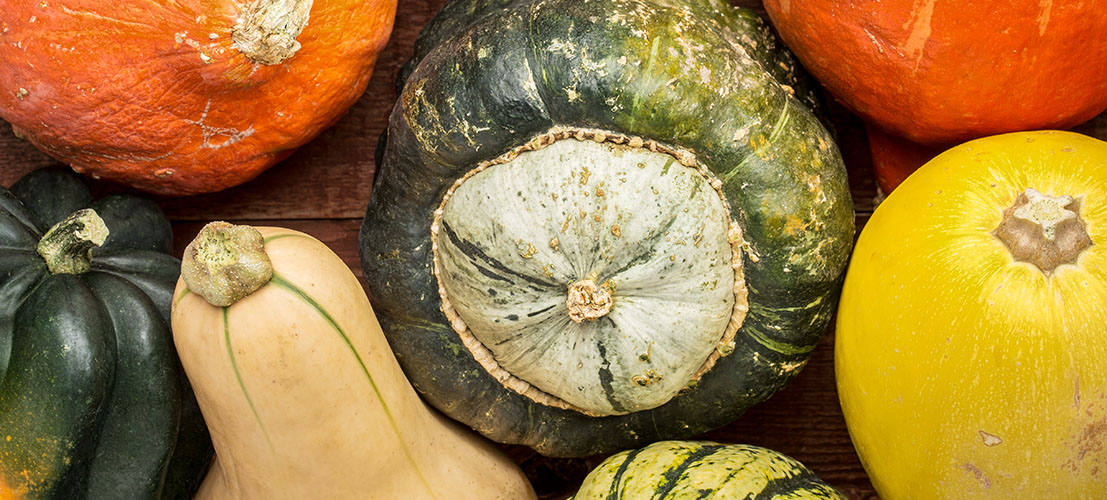
Fun fact: The seeds found inside of winter squash varieties make a delicious and
nutrient packed snack when roasted.
Winter squash is a member of Cucurbitaceae botanical family also known as the gourd family.
Some varieties of winter squash include: acorn, buttercup, butternut, carnival, delicata, hubbard, red kuri, spaghetti, etc.
Nutrition
- 1 cup of cooked winter squash is an excellent source of vitamin A, fiber, vitamin C, vitamin B6, and copper.
- Vitamin A supports growth, immune function, vision and reproduction.
- Fiber encourages weight loss while it also lowers risk of chronic diseases such as heart disease, type 2 diabetes and certain types of cancer.
- Vitamin C is an antioxidant that aids in immune function, wound healing and collagen and connective tissue formation.
- Vitamin B6 supports immune and nervous system function, along with red blood cell formation.
- Copper promotes bone, collagen and connective tissue formation.
How to Purchase, Prepare, and Store
-
Select squash with a firm outer rind (skin). Squash should also feel heavy and be free from bruises and soft spots.
-
Store in a cool and dry place, around 50°F, such as a basement. Can keep up to 3 months or more, depending on the variety and storage method.
-
Prepare squash by washing the outer rind. Using a cutting board on a firm surface, cut squash in half using a sharp knife. Use a spoon to scoop out seeds and stringy fibers. Bake in an oven safe dish with ½ cup of water, cut side down or brush with olive oil and bake for a “roasted” flavor. Bake for 45-60 minutes, checking for tenderness by piercing a fork through the skin. Baking times will vary. You can also cook in a microwave until tender.
-
Squash can be roasted or baked. Remove skin prior to consuming. Add to soups, salads, grain dishes, pies or muffins.
-
Freeze leftovers in individual containers or freezer bags. Just remove frozen squash in the morning and thaw in your refrigerator for use in your evening meal.
Nutrition Facts
1/2 cup cooked butternut squash, baked
- Calories: 82
- Protein: 1.84 g
- Fat: 0.184 g
- Carbohydrate: 21.5 g
- Fiber: 0.7 g
- Sugars: 6.56 g
- Calcium: 84 mg
- Magnesium: 59.4 mg
- Potassium: 582 mg
- Vitamin C: 31 mg
- Folate: 39 µg
- Vitamin A: 1140 IU
- Vitamin K: 2.05 µg
1/2 cup cooked acorn squash, baked
- Calories: 115
- Protein: 2.3 g
- Fat: 0.28 g
- Carbohydrate: 29.9 g
- Fiber: 9.02 g
- Calcium: 90.2 mg
- Magnesium: 88.2 mg
- Potassium: 896 mg
- Vitamin C: 22.1 mg
- Folate: 39 µg
- Vitamin A: 877 IU
Source: fdc.nal.usda.gov
Recipes
Request an Appointment
